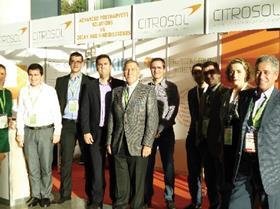
The amount of food thrown away by consumers and retailers has been the subject of much discussion recently but food waste is a problem that affects the entire supply chain.
For Benito Orihuel, CEO of Valencia-based postharvest solutions provider Citrosol, minimising losses during postharvest and storage is becoming an increasingly important factor in tackling food waste. With an estimated 12-25 per cent of fruits and vegetables lost at the postharvest stage, the challenge facing producers is considerable.
“Global institutions such as the United Nations Food and Agriculture Organization, the International Society for Horticultural Science and the World Food Preservation Centre agree that postharvest companies like Citrosol are set to play a greater role in cutting food waste as the demands placed on producers intensify,” he tells Fruitnet.
“Retailers, and society in general, is becoming ever more demanding when it comes to shelf-life, quality, food safety and the environment. We can help to square the circle by minimising losses and maintaining fruits and vegetables at an affordable price for consumers.”
Citrosol has been providing postharvest solutions to the industry for more than 50 years, first for citrus, then bananas and topfruit and most recently peppers, tomatoes and avocados.
In the past eight years its sales have more than doubled. Sales grew by 7.6 per cent in 2015 alone but this year the company anticipates more modest growth, mainly because of the fall in Spanish citrus production last season. However internationally the figure is closer to 20 per cent, fuelled largely by the company’s expansion into South Africa, Egypt and Peru.
The company recently inaugurated its new research and development facility at its headquarters in Potríes, Valencia. The €4m facility includes 1,100m2 of new laboratories on the upper floor and a pilot plant for “real world” trials including a drencher and full production line for post-harvest treatment, storage chambers and laboratories equipped with the latest technology.
“With this investment we have tripled our laboratory space and this will enable us to carry out more effective analysis providing faster and more accurate results using new diagnostic techniques,” says CEO Benito Orihuel.
Now that the centre is open, Citrosol has set itself the goal of doubling its research staff and budget over the next few years.
Recent product launches include Citroguanida LU, a disinfectant for areas and surfaces used in airfreighting product that is designed to be used in conjunction with Citrosol’s X3 Nebuliser.
“Together, they provide an efficient, easy-to-use and economical means of disinfecting packhouses that eliminates microorganisms in even the most hard to reach areas,” says Orihuel. “It allows companies to control problems associated with the proliferation of microbiological contamination and cut losses associated with fruit rot.”
Other recent launches include Citrocide Plus T system, a hygienic wash for tomatoes that controls rot, guarantees the safety of the product and reduces water usage. It follows the introduction three years ago of a similar washing system for peppers, Citrocide PC P, which signalled the company’s move into developing solutions the vegetable sector. Next in line is the launch of a similar product for avocados.



